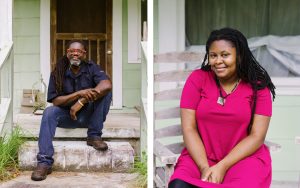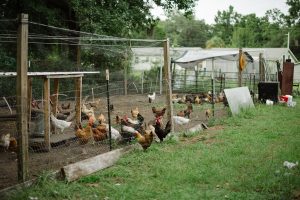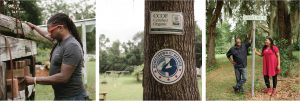I wanted coffee to start my morning. I gave a whiff of the stuff in the hotel lobby and decided that coffee could wait. I struck out down I-95 and figured I would find a shop on my way to Gilliard Farms. I settled for a Starbucks and ordered two cups of dark roast. As I drove away I hesitated and thought perhaps I should pull over and do some research on locally owned coffee shops in the area. After all, I was driving to meet with a guy who operates a sixth generation organic farm. Would it be ok to show up with a gift of corporate coffee?
Before this trip to Coastal Georgia for this article, I’d done some research on the back-to-the-land movement. These seemed like the sort of folks that would eschew my offering of corporate caffeine, but time was burning and the summer sun was getting hotter. If I wanted to tour a family farm before the heat became unbearable I would have to risk the embarrassment of getting the wrong coffee.
I turned off of the “hard road” and on to Gilliard Way, drove a short bit up the gravel road and parked near a massive oak. I called Matthew Raiford and let him know I had arrived. He met me in the road, flashed a big smile and took the coffee without hesitation. We shook hands, introduced ourselves and he said, gesturing with the cup of Starbucks, “THIS is just what I need this morning.”
With that positive nod to the conglomerate’s brew, the first stereotype of the new-agrarian was crushed. In nearly every article I read in preparation for this meeting, the people portrayed in the articles about the “back-to-the-land” movement were uniformly and exclusively white. Whiter than a Subaru brochure. They were either hippies or corporate burnouts looking for a portal back to a “simpler time.” The folks in those articles seemed more akin to Civil War reenactors than actual farmers. It looked a little like cos-play. Matthew didn’t look like he was auditioning to be an extra in a Mumford and Sons video. He looked like a guy getting ready to go to work.
But he wasn’t what I would expect to see from an “authentic” organic farmer either. Matthew is uncommonly handsome. He cuts a hearty figure and has a real sense of style. He sports dreads, a salt & pepper goatee, shouty red eyeglasses and fashionable boots. His voice only slightly betrays the Southern accent he has tried to bury by traveling the world and seeking his education in New York and California.
I’m not quite sure what I was expecting, but this wasn’t it. This was much better.

“If you want to see the land, let’s get to it before it gets too hot. It was ninety-seven yesterday and today won’t be any better.”
Coffee in hand and the sun peeking through the lattice of leaves as it continued its climb over the horizon, we started the tour, not in the fields, but at the old schoolhouse near the main road. He said that to understand what they are doing now, I needed to understand how it all came to be.
JUPITER ASCENDING Glynn County records show that in 1874, Jupiter Gilliard paid $9.00 in taxes on 476 acres of Georgia property. At first glance this doesn’t seem significant. A family, owning and occupying property is expected to pay taxes on the value of that property. But look a little deeper – just ten years earlier, the Gilliard family was property. Whoever owned Jupiter and his wife Riner, had to pay taxes on the value of them as human chattel. But by 1874, Jupiter Jr. and London Gilliard would stand to inherit the land of their parents, not their shackles.
Riner and Jupiter’s son, London, married a woman named Affie and they had a daughter, Florine. Florine married Horace Johnson and had a daughter, also named Affie. The younger Affie married Arthur Vickers and dies giving birth to her daughter, also named Affie. That Affie married Eulice Raiford and their children, Matthew and Althea, now farm Jupiter’s land.
136 years after those initial tax filings, through marriages and migrations, through personal and economic hardships, through wars and depressions, soul-crushing Jim Crow laws and triumphant civil rights victories and all that the lives of generations can endure, Matthew Raiford and Althea became the sixth generation to scratch into that Georgia sandy loam and coax a living from that storied dirt.
Over all of those generations family members built their homes across the property. Matthew remembers going from home to home, as a child, playing with his cousins and returning home long after sundown.
“If the moon wasn’t out, it was so dark out here that you couldn’t see to get from my Nanna’s house back to my house. We would call on the party-line phone and say ‘Turn on the back porch light so I can see to get home.’ I was so scared of what might be in that dark that I would run as fast as I could, all the way to my house. Now, that kind of dark is a luxury. You can only get that kind of dark out here in the country. It didn’t exist in the cities where I lived after leaving Georgia.”

RETURN TO THE EARTH The return to Georgia was unlikely. Matthew made up his mind early on to get out of the South and never look back. When he thought of rural Georgia, he didn’t see opportunity, so he joined the Army and traveled the world. After the Army, he studied the culinary arts, graduating from the Culinary Institute of America in Hyde Park, New York and worked in exquisite fine-dining kitchens, including a stint as Executive Chef for the United States House of Representatives. Country life in Georgia was just a sweet, childhood memory that inspired him from the past. He never considerd it as part of his future.
“As he tells it, “I used to have these conversations with my grandmother and she would ask ‘What are we gonna do with all this land?’ I would tell her ‘Y’all should go back to farming it.’ But then I came back home for a family reunion, something I hadn’t done in years. This time, when she asked ‘What are we gonna do with all this land?’ I was hit with a need to come home. I just blurted out ‘I think WE should go back to farming it.’ I convinced my sister to join me and that’s how it happened. We just came back home.”
Like so many wayward sons returning to the place of their birth, he had ideas–ideas about what they should be growing. He was ready to leave his mark on this land of his ancestors. Ready to tame this land and show his grandmother what the land could become. He planted an orchard and watched it fail. He planted new crops and saw the harvests go unpurchased and spoil. Reaching out to the extension agent in the area, he learned quickly how little he knew and how far he had to go. To fast-track his learning curve he studied organic horticulture, graduating from the prestigious program at the University of California at Santa Cruz. He recounted to me a conversation he had with his grandmother upon his return, filled with “new” knowledge.

“I was so excited when we talked about Santa Cruz. I told her about sustainable crop rotation to replenish the soil without chemical fertilizers and she said ‘Ok, but what did you learn?’ I was confused by her response so I tried to explain to her about mulching techniques and moving the chicken coops around so that the droppings could work their magic on the dirt and how certain plants worked to attract certain insects that are beneficial to the whole farm. Once again, she said ‘Ok, but what did you learn?’ At that point I realized that she already knew everything that I had ‘learned.’ She looked around the house and found notes and letters between the family about crop yields and what was and wasn’t working back then. I remembered looking at pamphlets from the extension office and seeing that for the first ten years of operation, you’re considered a Beginning Farmer. It was humbling.”
Matthew’s arc from exuberant hubris to stark humility was a quick one, enabling him to stop dwelling on a dream and concentrate on the very real, very hard work at hand. Farming isn’t some idyllic, pastoral lifestyle with iced tea sipped from mason jars in the middle of a sun and shadow dappled field resembling a landscape painting hung in a big city gallery. Farming is back-breaking labor under an unmerciful sun with semi-cold water gulped from worksite coolers to keep you from falling out in the heat. The land doesn’t give a tinker’s damn about you, your story or your dreams. The land, left to its own devices, will just turn wild without giving it any thought. It’s just dirt and vegetation and its tendency is toward entropy, not toward ordered cultivation. As Matthew likes to say, he’s farming “on purpose.” He had his chance to leave, he took it and now he’s back.

THE FARM When Matthew first greeted me that morning, we weren’t alone. Two chickens and a smallish rooster darted out from the shade of a tall pine to announce their presence. Matthew jokingly called them “the escape artists.” Nothing, he said, could keep them in the coop. They wanted out, but they never went too far.
The absconders followed us from the road to the high-tunnel near the back of the property. I asked if they would follow us all day and he laughed, “They won’t get too close to that tree line. There’s nothing in those woods that’s friendly to them.”
Sure enough, as we neared the edge of the pasture, the three of them turned and headed back toward the coop. It was late July so most of the bounty from the farm was long since harvested, sold and eaten, but the evidence of the growing cycle was everywhere. Matthew showed me where severe winds had torn apart the sheeting that once covered the high tunnel and how some of it was now being used to cover the ground and burn off the grassy weeds in preparation for a later planting. The remnants of the sunflower harvest were still under the arches of the former structure. Some volunteer seeds had sprouted and come back to full height of over six feet. He showed me the rows of herbs that Jovan was growing as part of her partnership with a distillery to make a super-perfumed gin. We poked around the compost piles that were steaming on concrete slabs and turning waste into treasure.
The tour reminded me that on a farm, there is so much more that has to happen than just planting and harvesting. Taming the land to work for you takes immense work from you. I imagined his to-do list looking like a never-ending scroll just rolling away from him and out of sight. We made our way back toward the houses where the muscadine vines were coiling around themselves in a thatch. There were bees everywhere, particularly on and around the ground where the over-ripened fruit lay burst in the sun. I had seen hives close to the woods and Matthew said they had great luck with their bees, mainly because there weren’t any pesticides around.
The hens and roosters in the coop squawked at the three “free birds” who marched around the perimeter of the wire enclosure. While we talked, Matthew pulled handfuls of amaranth and tossed them over the fence into the coop until there was a pile of the red plant as high as the hen house. “This stuff grows wild and farmers around here try to kill it. They call it pigweed but it’s a great eating grain. In Jamaica this is what they use to make pepperpot soup and callaloo. I’m thinking about just planting a small plot of it. Jovan says its good for high cholesterol and you can even make a strong red dye with it.”
The chickens agree that the amaranth is a treat and set to work stripping the leaves and seeds. In an hour or so, there won’t be anything but stems left.
Mississippi horticulturalist, Felder Rushing, likes to say “If you don’t want to see weeds in my garden, squint.” Gilliard farms is just like that. It walks the tightrope between wild and cultivated, between manicured and feral. There are beautifully pruned roses alongside patches of vegetables competing for dirt with weeds. The battle between the “good” plants and the “bad” ones is never-ending and the plants certainly don’t know what team they’re even playing for.

We’ve spent enough time kicking dust in the sun and the heat is now getting to its apex. Matthew asks “When do you want to do the interview? It’s getting late and I’ve got to fix the air conditioner in the shop before Jovan gets back from Atlanta.”
“It started when I handed you that cup of coffee.” I laughed, “But why don’t we continue it after the sun goes down? Do y’all have dinner plans?”
“I tell you what, why don’t I get this ac fixed and we can have dinner here. You like deer meat? I can make some chili.”
With that he walked me back to my car, pausing to show me a spot where a pecan tree had grown to completely engulf a stretch of hogwire fence.
“I had a guy out here to clean up some junk and he asked me if I wanted him to cut this fence down. I told him no, that fence could stay. There’s a lesson in this somewhere. I don’t know what it is yet, but I’m sure I’ll figure it out one day.”
DINNER WITH FRIENDS She didn’t grow up in the country. Jovan Sage was a city girl in Kansas City, but with country roots. Her grandparents were from rural Mississippi and as she says, she always had a “country heart.” She loved working in her grandfather’s shop and spending time in the farmer’s market. Food was a calling but she had no idea how far that calling would take her. In Brooklyn she kept a rooftop garden that kickstarted her love of food-as-medicine. Her passion became her vocation when she worked in cafes, restaurants and with Slow Food, USA. It was at a Slow Food conference in Italy where she met Matthew. She says they met at just the right time in both of their lives. This encounter happened not too long after he had returned to Gilliard farms and his mid-life career change was a great catalyst for their relationship. They kept up a long-distance romance until it became impossible for them to remain apart. She gave up the city life and joined him on the farm. Combining her passion for herbs with his cooking talent, together they opened (and recently closed) a restaurant in downtown Brunswick, The Farmer and The Larder, which garnered Matthew significant recognition and a James Beard nomination for Best Chef; Southeast.
“I went from having a few feet of rooftop garden and a few chickens to having more dirt and chickens than I knew what to do with.” Jovan told my wife, Kitty, and I as we sipped a cool French rosé waiting for Matthew to finish tossing a watermelon, feta and basil flower salad.
A big fan droned on behind us. Matthew explained he was unable to fix the air conditioner and ended up swapping it out with another unit from the guest house.
“I hope you don’t mind the fan, but that little window unit just hasn’t had time to get the room cooled off.” He said, placing the salad on the table.

This dinner was supposed to be the continuation of an interview, but at some point I just put my notepad away. I was having such a great time and Kitty was intently conversing with Jovan like the two of them were old high-school friends who hadn’t seen each other since graduation. We passed around a plate of fresh cheese and crackers, topped with honey from a hive just a few hundred yards from the dinner table. The chili was made from a deer harvested in the woods by the high tunnel and the biscuits were made from local sorghum.
We stayed long enough for the little window unit to finally get the job done. A friend of theirs dropped by, joined us for some wine and a bowl of chili and all the formality of the journalist/subject relationship vanished. I didn’t mind. Stories about places are meaningless to me. Great stories need people and great people inspire us to write.
Kitty and I left the farm and headed back to the hotel in Brusnwick. In the middle of Gallilee Road, we met a black calf who was just as surprised to see us. I pulled over and got out of the car to see if I could do…something. Kitty called Matthew and Jovan but got no answer. I gestured wildly at the skittish beast and he or she just calmly walked over to a low spot in the fence and jumped over.
I got back in the car and laughed, “Must have been taking lessons from the chickens.”

JUPITER REFLECTED In the story of Jupiter Gilliard and his descendants who care for his land there lies a reflection of his life and a lesson for this nation and this author. Jupiter was born into a system of unimaginable cruelty. He was part of a system that no one would ever choose to become a willing part of, but he endured it. He and his wife emerged as landowners in the county that once taxed his owner for the value of his flesh. He stayed in that same county and sought a better life for his family. He was the embodiment of perfecting a constitution that made promises that it couldn’t originally keep. Jupiter was born with no rights in a country that bragged of equality and freedom. Six generations later, his posterity are planting seeds in the same rich Georgia soil, hoping for rain, toiling in the sun and bringing forth a harvest freely and of their own choosing. Perhaps this is the lesson of that pecan tree and the hogwire fence that Matthew hasn’t figured out yet. That tree is Jupiter. He has grown slowly, over years and years to take what once were his bindings and make them part of his strength. Jupiter unbound.
Written by Tom Ramsey / Photography by Brent Cline

